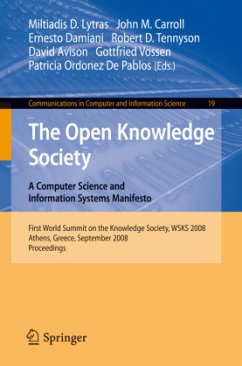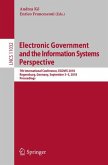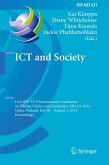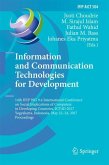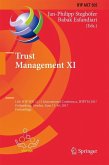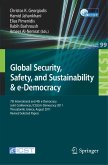The Open Knowledge Society
A Computer Science and Information Systems Manifesto
Herausgegeben:Lytras, Miltiadis D.; Carroll, John M.; Damiani, Ernesto; Tennyson, Robert D.; Avison, David; Vossen, Gottfried; Ordóñez de Pablos, Patricia
The Open Knowledge Society
A Computer Science and Information Systems Manifesto
Herausgegeben:Lytras, Miltiadis D.; Carroll, John M.; Damiani, Ernesto; Tennyson, Robert D.; Avison, David; Vossen, Gottfried; Ordóñez de Pablos, Patricia
- Broschiertes Buch
- Merkliste
- Auf die Merkliste
- Bewerten Bewerten
- Teilen
- Produkt teilen
- Produkterinnerung
- Produkterinnerung
It is a great pleasure to share with you the Springer CCIS proceedings of the First World Summit on the Knowledge Society - WSKS 2008 that was organized by the Open Research Society, NGO, and hosted by the American College of Greece, during September 24-27, 2008, in Athens, Greece. The World Summit on the Knowledge Society Series is an international attempt to promote a dialogue on the main aspects of a knowledge society toward a better world for all based on knowledge and learning. The WSKS Series brings together academics, people from industry, policy makers, politicians, government officers…mehr
Andere Kunden interessierten sich auch für
![Smart Working, Living and Organising Smart Working, Living and Organising]() Smart Working, Living and Organising38,99 €
Smart Working, Living and Organising38,99 €![Electronic Government and the Information Systems Perspective Electronic Government and the Information Systems Perspective]() Electronic Government and the Information Systems Perspective38,99 €
Electronic Government and the Information Systems Perspective38,99 €![ICT and Society ICT and Society]() ICT and Society75,99 €
ICT and Society75,99 €![Information and Communication Technologies for Development Information and Communication Technologies for Development]() Information and Communication Technologies for Development113,99 €
Information and Communication Technologies for Development113,99 €![Trust Management XI Trust Management XI]() Trust Management XI38,99 €
Trust Management XI38,99 €![Global Security, Safety, and Sustainability Global Security, Safety, and Sustainability]() Global Security, Safety, and Sustainability38,99 €
Global Security, Safety, and Sustainability38,99 €![Contractual Management Contractual Management]() Contractual Management38,99 €
Contractual Management38,99 €-
-
-
It is a great pleasure to share with you the Springer CCIS proceedings of the First World Summit on the Knowledge Society - WSKS 2008 that was organized by the Open Research Society, NGO, and hosted by the American College of Greece, during September 24-27, 2008, in Athens, Greece. The World Summit on the Knowledge Society Series is an international attempt to promote a dialogue on the main aspects of a knowledge society toward a better world for all based on knowledge and learning. The WSKS Series brings together academics, people from industry, policy makers, politicians, government officers and active citizens to look at the impact of infor- tion technology, and the knowledge-based era it is creating, on key facets of today's world: the state, business, society and culture. Six general pillars provide the constitutional elements of the WSKS series: - Social and Humanistic Computing for the Knowledge Society--Emerging Te- nologies and Systems for the Society and Humanity - Knowledge, Learning, Education, Learning Technologies and E-learning for the Knowledge Society - Information Technologies--Knowledge Management Systems--E-business and Enterprise Information Systems for the Knowledge Society - Culture and Cultural Heritage--Technology for Culture Management--Management of Tourism and Entertainment--Tourism Networks in the Knowledge Society - Government and Democracy for the Knowledge Society - Research and Sustainable Development in the Knowledge Society The summit provides a distinct, unique forum for cross-disciplinary fertilization of research, favoring the dissemination of research that is relevant to international re-
Produktdetails
- Produktdetails
- Communications in Computer and Information Science 19
- Verlag: Springer / Springer Berlin Heidelberg / Springer, Berlin
- Artikelnr. des Verlages: 12529865, 978-3-540-87782-0
- 2008
- Seitenzahl: 784
- Erscheinungstermin: 11. September 2008
- Englisch
- Abmessung: 235mm x 155mm x 42mm
- Gewicht: 1181g
- ISBN-13: 9783540877820
- ISBN-10: 3540877827
- Artikelnr.: 25395164
- Herstellerkennzeichnung Die Herstellerinformationen sind derzeit nicht verfügbar.
- Communications in Computer and Information Science 19
- Verlag: Springer / Springer Berlin Heidelberg / Springer, Berlin
- Artikelnr. des Verlages: 12529865, 978-3-540-87782-0
- 2008
- Seitenzahl: 784
- Erscheinungstermin: 11. September 2008
- Englisch
- Abmessung: 235mm x 155mm x 42mm
- Gewicht: 1181g
- ISBN-13: 9783540877820
- ISBN-10: 3540877827
- Artikelnr.: 25395164
- Herstellerkennzeichnung Die Herstellerinformationen sind derzeit nicht verfügbar.
Gottfried Vossen lehrt seit 1993 Informatik am Institut für Wirtschaftsinformatik der Universität Münster. Er studierte, promovierte und habilitierte sich an der RWTH Aachen und war bzw. ist Gastprofessor u.a. an der University of California in San Diego, USA, an der Karlstad Universitet in Schweden, an der University of Waikato in Hamilton, Neuseeland sowie am Hasso-Plattner-Institut für Softwaresystemtechnik in Potsdam. Er ist europäischer Herausgeber der bei Elsevier erscheinenden Fachzeitschrift Information Systems und seit Januar 2004 Vizepräsident der Gesellschaft für Informatik e.V. mit Sitz in Bonn.
Significant Learning Communities - A Humanistic Approach to Knowledge and Human Resource Development in the Age of the Internet.- Wisdom Networks: Towards a Wisdom-Based Society.- Step by Step Framework for Evaluation of In-Formation Technology Benefit in Social Scenarios.- The Knowledge Society Agenda in Romania: From Experts' Vision to Public Perception.- A Framework for the Knowledge Society Ecosystem: A Tool for Development .- The Green and Gold Road: Journal Management and Publishing Workflow Extensions for the DSpace Repository Platform.- The Biggest Human GRID-s of the Future: Hybridization of Science and Public Education.- The Grid for Learning.- Online Social Networks: Why Do "We" Use Facebook?.- Localization of Educational Software for Deaf Children: Suggestions and Perspectives.- Bottleneck of Knowledge Society.- Emerging Approach to E2.0: The Case of Social Enterprise - First Results from a 1-Year Field Research.- Emergent Innovation and Sustainable Knowledge Co-creation A Socio-epistemological Approach to "Innovation from within".- Contribution to the Analysis of Motion Behaviour of People in a Region Using Video Frames.- The Human Web and the Domestication of the Networked Computer.- Evaluation of the Energy Efficiency of Renewable Biomass Fuels: An Environmental and Financial Approach.- Strategic Use of Information Technology in Profit and Non-profit Organizations from Tanzania and Sweden.- Views on Globalization of Higher Education.- Learning Objects for eLearning Systems.- Personalized Video Browsing and Retrieval in a Semantic-Based Learning Environment.- Intelligent Tutoring in the Semantic Web and Web 2.0 Environments.- Knowledge Management and eLearning in Professional Development.- MILCA - A Mobile and Interactive LearningEnvironment on Campus.- An Evolutionary Approach for Domain Independent Learning Object Sequencing.- Semantic Reasoning in Advanced E-Learning Brokerage Systems.- The Use of Wireless Network in Education.- Context-Aware Mobile Learning.- Reliable Personalized Learning Paths: The Contribution of Trust to E-Learning.- Advanced Tool to Develop the Assessment Process in Collaborative e-Learning Environments.- Collaborative Work and Multi-criteria Organization of Web Educational Resources: A Theoretical Framework.- Knowledge, Knowledge Security, and Meta-knowledge.- Content Requirements Identification towards the Design of an Educational Portal.- Training Adults on Traditional vs. Web 2.0 IS Topics: The Trainees' View.- ERA - E-Learning Readiness Analysis: A eHealth Case Study of E-Learning Readiness .- Applications and Exploration of ICT in Teaching History and Foreign Languages: Students and Teachers Attitudes, Perceptions and Evaluation.- Learning to Invent: Let the New Knowledge Come.- The New Informatics Technologies in Education Debate.- King Saud University Drive toward the Knowledge Society: A STOPE View .- Metadata and Knowledge Management Driven Web-Based Learning Information System.- Case-Based Reasoning: A Recent Theory for Problem-Solving and Learning in Computers and People.- SOLERES-HCI: Modelling a Human-Computer Interaction Framework for Open EMS.- Improving the Learning Process of Engineering Students by Deployment of Activating ICTs.- Modeling Student's Mood during an Online Self-assessment Test.- Enhancing Motivation, School Competence and Self-perception of Physics in the Environment of the Cognitive Tutor CTAT during Physics Instruction.- An Examination of Assessment Practices in Colleges of Business at Various Middle East Countries.- A Survey onLearning Profiles of the Educators of Roma in Greece in Order to Develop the Proper E-Learning Environment for Their Training.- The Organizational Value of Tacit Knowledge Derived from Parenting.- Assessing Enterprise's Knowledge Management Maturity Level.- Grid Technologies to Support B2B Collaboration.- Strategic and Managerial Ties for the New Product Development.- Semantic Web or Web 2.0? Socialization of the Semantic Web.- A Critical Review of the Impact of Knowledge Management on Higher Education.- On Growth of Network and Centrality's Change Analysis of Co-inventors Network in Enterprise.- Computer-Supported Interaction for Preparing Logically Organized Documents.- How Intranet Has Been Evolving in Banking: A Longitudinal Research.- Is the Digital Generation Ready for Web 2.0-Based Learning?.- Lean Six Sigma Applied to Supply Chains within a Services Organisation - A Practical Solution.- The Project Manager as Knowledge Creator and Communicator Analyzed with the Help of the Theatre Metaphor for Conscious Experience.- Software Engineering 2.0: A Social Global Repository Based on Semantic Annotation and Social Web for Knowledge Management.- Tools for the Information System Function Management: A Roadmap.- A Teleological Perspective towards the Definition and Measurement of Intellectual Capital.- A Decision Analytic Tool for Assessing Decision Making Performance.- Studying Research on E-Markets during 1995-2005.- Knowledge Agent Theory and Its Autopoietic Characteristics for Authentic Knowledge Management.- The Effect of Organizational Learning Tools in Business Results.- Classification of Satellite Images Using the Cellular Automata Approach.- Preliminary Study of the Expected Performance of MAUT Collaborative Filtering Algorithms.- Distributed DependableEnterprise Business System - DDEBS.- An Ontology Crystallization Approach to Designing Performance-Based Testing Scenario.- The Art and Impact of Physical and Virtual Enterprise Incubators: The Greek Paradigm.- Designing IT Systems for NGOs: Issues and Directions.- Developing Ontology Based Applications of Semantic Web Using UML to OWL Conversion.- Studying Students' Conceptual Grasp of OOP Concepts in Two Interactive Programming Environments.- Interview-Based Photo Tagging for Expressing Course Concepts in Ubiquitous Chinese Poetry Learning.- Travel Navigator.- Moving Assistive Technology on the Web: The Farfalla Experience.- Evaluation of Mobile Tourist Guides.- Airlines Websites Evaluation Around the World.- Framing Knowledge: Global Youth Culture as Knowledge Society (Research in Progress).- New Technology in Modern Museum Policy.- Deploying Thick Mobile Clients Using Thin Client Architecture: A Case in Mobile Tourist Guides.- An E-Culture Environment for Common Citizens and Visually Impaired Individuals.- Arguments That Support Decisions in E-Cognocracy: A Quantitative Approach Based on Priorities Intensity.- The Impact of a Service Oriented Approach as an Enabler for E-Government Educational Services for All Citizens.- An Adapted Evaluation Method for Rural SMEs Oriented e-Learning Services/Projects.- A Practical Approach to a Semantic-Based eGovernment Platform: The PLEDGE project.- Pilot Evaluation of an Online Observatory of Agricultural Electronic Markets.- On Linking Cultural Spaces and e-Tourism: An Ontology-Based Approach.- A Co-evolutionary Interaction Design of Digital TV Applications Based on Verbal Decision Analysis of User Experiences.- Looking at the Knowledge Economy: Some Issues on Theory and Evidence.- The New Oil Pipeline from Bourgas toAlexandroupoli: Critical Analysis of Simulation Methods for the Protection of the Aegean Sea.- Resources, Activities and Competitive Advantage: Application to Outsourcing.- An Empirical Investigation on IT Training Sources.
Significant Learning Communities - A Humanistic Approach to Knowledge and Human Resource Development in the Age of the Internet.- Wisdom Networks: Towards a Wisdom-Based Society.- Step by Step Framework for Evaluation of In-Formation Technology Benefit in Social Scenarios.- The Knowledge Society Agenda in Romania: From Experts' Vision to Public Perception.- A Framework for the Knowledge Society Ecosystem: A Tool for Development .- The Green and Gold Road: Journal Management and Publishing Workflow Extensions for the DSpace Repository Platform.- The Biggest Human GRID-s of the Future: Hybridization of Science and Public Education.- The Grid for Learning.- Online Social Networks: Why Do "We" Use Facebook?.- Localization of Educational Software for Deaf Children: Suggestions and Perspectives.- Bottleneck of Knowledge Society.- Emerging Approach to E2.0: The Case of Social Enterprise - First Results from a 1-Year Field Research.- Emergent Innovation and Sustainable Knowledge Co-creation A Socio-epistemological Approach to "Innovation from within".- Contribution to the Analysis of Motion Behaviour of People in a Region Using Video Frames.- The Human Web and the Domestication of the Networked Computer.- Evaluation of the Energy Efficiency of Renewable Biomass Fuels: An Environmental and Financial Approach.- Strategic Use of Information Technology in Profit and Non-profit Organizations from Tanzania and Sweden.- Views on Globalization of Higher Education.- Learning Objects for eLearning Systems.- Personalized Video Browsing and Retrieval in a Semantic-Based Learning Environment.- Intelligent Tutoring in the Semantic Web and Web 2.0 Environments.- Knowledge Management and eLearning in Professional Development.- MILCA - A Mobile and Interactive LearningEnvironment on Campus.- An Evolutionary Approach for Domain Independent Learning Object Sequencing.- Semantic Reasoning in Advanced E-Learning Brokerage Systems.- The Use of Wireless Network in Education.- Context-Aware Mobile Learning.- Reliable Personalized Learning Paths: The Contribution of Trust to E-Learning.- Advanced Tool to Develop the Assessment Process in Collaborative e-Learning Environments.- Collaborative Work and Multi-criteria Organization of Web Educational Resources: A Theoretical Framework.- Knowledge, Knowledge Security, and Meta-knowledge.- Content Requirements Identification towards the Design of an Educational Portal.- Training Adults on Traditional vs. Web 2.0 IS Topics: The Trainees' View.- ERA - E-Learning Readiness Analysis: A eHealth Case Study of E-Learning Readiness .- Applications and Exploration of ICT in Teaching History and Foreign Languages: Students and Teachers Attitudes, Perceptions and Evaluation.- Learning to Invent: Let the New Knowledge Come.- The New Informatics Technologies in Education Debate.- King Saud University Drive toward the Knowledge Society: A STOPE View .- Metadata and Knowledge Management Driven Web-Based Learning Information System.- Case-Based Reasoning: A Recent Theory for Problem-Solving and Learning in Computers and People.- SOLERES-HCI: Modelling a Human-Computer Interaction Framework for Open EMS.- Improving the Learning Process of Engineering Students by Deployment of Activating ICTs.- Modeling Student's Mood during an Online Self-assessment Test.- Enhancing Motivation, School Competence and Self-perception of Physics in the Environment of the Cognitive Tutor CTAT during Physics Instruction.- An Examination of Assessment Practices in Colleges of Business at Various Middle East Countries.- A Survey onLearning Profiles of the Educators of Roma in Greece in Order to Develop the Proper E-Learning Environment for Their Training.- The Organizational Value of Tacit Knowledge Derived from Parenting.- Assessing Enterprise's Knowledge Management Maturity Level.- Grid Technologies to Support B2B Collaboration.- Strategic and Managerial Ties for the New Product Development.- Semantic Web or Web 2.0? Socialization of the Semantic Web.- A Critical Review of the Impact of Knowledge Management on Higher Education.- On Growth of Network and Centrality's Change Analysis of Co-inventors Network in Enterprise.- Computer-Supported Interaction for Preparing Logically Organized Documents.- How Intranet Has Been Evolving in Banking: A Longitudinal Research.- Is the Digital Generation Ready for Web 2.0-Based Learning?.- Lean Six Sigma Applied to Supply Chains within a Services Organisation - A Practical Solution.- The Project Manager as Knowledge Creator and Communicator Analyzed with the Help of the Theatre Metaphor for Conscious Experience.- Software Engineering 2.0: A Social Global Repository Based on Semantic Annotation and Social Web for Knowledge Management.- Tools for the Information System Function Management: A Roadmap.- A Teleological Perspective towards the Definition and Measurement of Intellectual Capital.- A Decision Analytic Tool for Assessing Decision Making Performance.- Studying Research on E-Markets during 1995-2005.- Knowledge Agent Theory and Its Autopoietic Characteristics for Authentic Knowledge Management.- The Effect of Organizational Learning Tools in Business Results.- Classification of Satellite Images Using the Cellular Automata Approach.- Preliminary Study of the Expected Performance of MAUT Collaborative Filtering Algorithms.- Distributed DependableEnterprise Business System - DDEBS.- An Ontology Crystallization Approach to Designing Performance-Based Testing Scenario.- The Art and Impact of Physical and Virtual Enterprise Incubators: The Greek Paradigm.- Designing IT Systems for NGOs: Issues and Directions.- Developing Ontology Based Applications of Semantic Web Using UML to OWL Conversion.- Studying Students' Conceptual Grasp of OOP Concepts in Two Interactive Programming Environments.- Interview-Based Photo Tagging for Expressing Course Concepts in Ubiquitous Chinese Poetry Learning.- Travel Navigator.- Moving Assistive Technology on the Web: The Farfalla Experience.- Evaluation of Mobile Tourist Guides.- Airlines Websites Evaluation Around the World.- Framing Knowledge: Global Youth Culture as Knowledge Society (Research in Progress).- New Technology in Modern Museum Policy.- Deploying Thick Mobile Clients Using Thin Client Architecture: A Case in Mobile Tourist Guides.- An E-Culture Environment for Common Citizens and Visually Impaired Individuals.- Arguments That Support Decisions in E-Cognocracy: A Quantitative Approach Based on Priorities Intensity.- The Impact of a Service Oriented Approach as an Enabler for E-Government Educational Services for All Citizens.- An Adapted Evaluation Method for Rural SMEs Oriented e-Learning Services/Projects.- A Practical Approach to a Semantic-Based eGovernment Platform: The PLEDGE project.- Pilot Evaluation of an Online Observatory of Agricultural Electronic Markets.- On Linking Cultural Spaces and e-Tourism: An Ontology-Based Approach.- A Co-evolutionary Interaction Design of Digital TV Applications Based on Verbal Decision Analysis of User Experiences.- Looking at the Knowledge Economy: Some Issues on Theory and Evidence.- The New Oil Pipeline from Bourgas toAlexandroupoli: Critical Analysis of Simulation Methods for the Protection of the Aegean Sea.- Resources, Activities and Competitive Advantage: Application to Outsourcing.- An Empirical Investigation on IT Training Sources.

